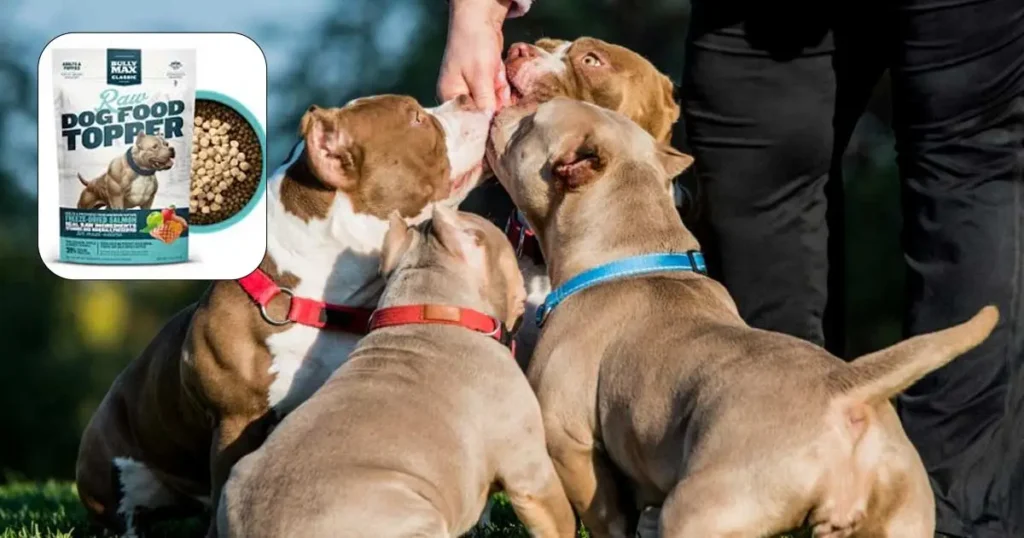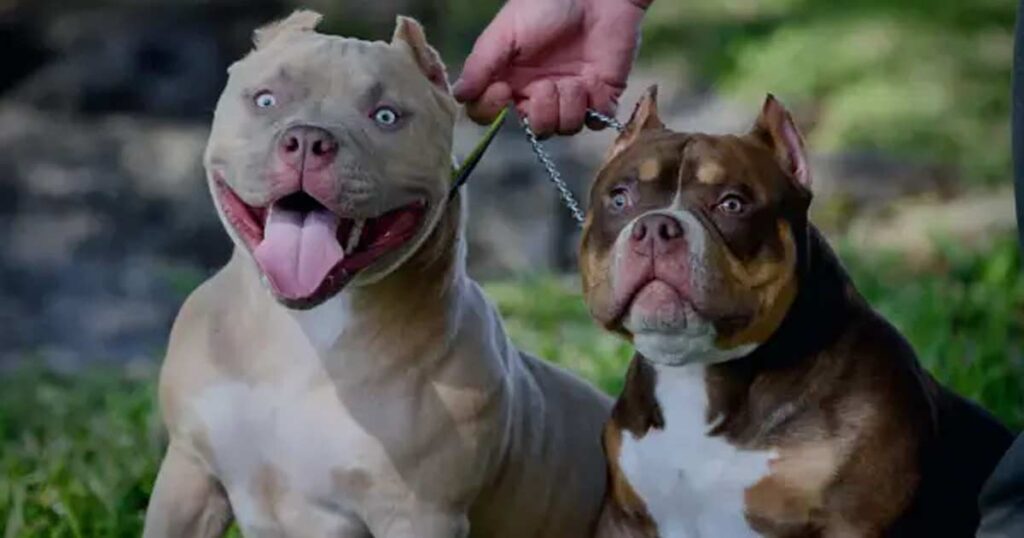The American Bully is an energetic and muscular breed, which makes proper nutrition crucial for their health and well-being. A balanced diet filled with high-quality proteins, healthy fats, and essential vitamins supports their robust build and active lifestyle. Feeding them the right nutrients ensures they grow properly, maintain a healthy weight, and live a long, vibrant life.
Feeding your American Bully the right portion sizes is essential to keep them at an ideal weight and avoid health problems like obesity. Proper portions, combined with a diet tailored to their specific needs, help sustain energy levels and prevent various issues. Monitoring their food intake and adjusting as needed ensures they stay fit and energetic.
Choosing the best feeding option for your American Bully involves understanding the benefits of commercial dog food, raw diets, and home-cooked meals. Each option has its advantages, but consistency in quality and adhering to proper feeding guidelines are key. Consulting a veterinarian helps ensure your dog enjoys a healthy, active life, no matter the diet you choose.
Understanding the fundamentals of American Bully nutrition can help you make informed choices that benefit your dog’s health. With the right dietary plan, you can ensure that your furry friend leads a happy, healthy, and active life.
Nutritional Requirements for American Bullies
American Bullies require a nutrient-rich diet that supports their muscular build and active lifestyle. Key components include high-quality proteins, healthy fats, carbohydrates, and essential vitamins and minerals. Proteins are fundamental for muscle growth, repair, and overall development, making them a critical part of your dog’s diet.
Healthy fats, such as omega-3 and omega-6 fatty acids, not only provide energy but also promote a healthy coat and skin. Carbohydrates serve as an important energy source and can help maintain stable blood sugar levels. Additionally, vitamins and minerals play vital roles in bone health, immune function, and overall cellular processes, ensuring your dog stays active and healthy.
- Key nutrients: proteins, fats, carbohydrates, vitamins, minerals
- Importance of high-quality protein sources (chicken, beef, fish)
- Role of fats in energy and health
When selecting food for your American Bully, it’s essential to read labels carefully to ensure they contain these crucial nutrients. A balanced diet tailored to their specific needs will keep your dog vibrant and energetic.
Best Diet Options for American Bullies
Choosing the right diet for your American Bully involves evaluating several options, including commercial dog food, raw diets, and home-cooked meals. Commercial dog food is convenient and often formulated to meet the nutritional needs of large breeds. It’s essential to select high-quality brands that provide balanced nutrition and avoid fillers and artificial additives.
A raw diet, which consists of raw meat, bones, and vegetables, can be beneficial for some American Bully Grooming. However, it requires careful planning to ensure that it is nutritionally complete and safe. While many dog owners report improved energy and coat quality with raw diets, it’s crucial to consult with a veterinarian before making this switch to understand the potential risks and benefits.
Home-cooked meals offer another option, allowing you to control the ingredients and ensure quality. However, preparing a balanced home-cooked diet can be challenging and time-consuming. Always ensure that meals are nutritionally balanced and suitable for your dog’s specific needs.
Age and Activity Level Considerations
The nutritional needs of American Bullies change significantly as they age and depending on their activity level. Puppies require a diet that is rich in calories and nutrients to support their rapid growth and development. High-protein foods are vital during this stage to help build strong muscles and bones.
As American Bullies transition into adulthood, their dietary focus shifts to maintenance. Adult dogs typically require fewer calories than puppies, so it’s crucial to monitor their weight and adjust food portions accordingly. For active adults, higher protein and calorie content can help maintain their energy levels, especially if they engage in regular exercise.
Senior American Bullies often benefit from diets that are lower in calories but higher in fiber. This helps support digestion and prevents obesity, which can lead to various health issues. Adjusting their diet as they age ensures they receive the right balance of nutrients to support their changing needs.
Weight Management and Obesity Prevention
Maintaining a healthy weight is critical for American Bullies, as obesity can lead to serious health issues like joint problems, diabetes, and heart disease. Regularly assessing your dog’s body condition score can help you identify if your pet is at a healthy weight or if adjustments are needed. Understanding how to read your dog’s body language and physical appearance is essential for proactive weight management.
Portion control is a key strategy in preventing obesity. Providing appropriate serving sizes based on your dog’s weight and activity level can help prevent overeating. It’s also important to avoid giving too many treats, as these can add extra calories to their diet without providing essential nutrients.
Engaging your American Bully in regular exercise is just as important as managing their diet. Daily walks, playtime, and structured activities can help burn off excess calories and keep your dog physically fit. Combining a balanced diet with regular physical activity is the best approach to maintaining a healthy weight.
Common Health Issues Related to Nutrition
American Bullies are prone to certain health issues that can be influenced by their diet. Food allergies and sensitivities are common and can manifest as skin irritations or gastrointestinal problems. Recognizing the signs of allergies, such as itching or digestive upset, is crucial for timely intervention.
Digestive issues can also arise from feeding low-quality food or making abrupt changes to their diet. Ensuring that you provide a consistent diet and transitioning to new foods gradually can help prevent digestive distress. Additionally, certain diets can support gut health, making it easier for your dog to digest food and absorb nutrients.
Joint health is another critical consideration, especially as American Bullies age. Nutritional choices can either support or hinder joint function, so including ingredients that promote joint health, like glucosamine, in their diet can be beneficial. Regular veterinary check-ups can help monitor these health aspects.
Feeding Guidelines
Establishing a proper feeding routine is essential for your American Bully’s health and well-being. Daily feeding frequency typically ranges from two to three meals, depending on your dog’s age and size. Consistent meal times can help regulate digestion and stabilize energy levels throughout the day.
Portion sizes should be calculated based on your dog’s weight, age, and activity level. Following the feeding guidelines provided on commercial dog food packaging can serve as a helpful starting point. Monitoring your dog’s weight regularly will allow you to adjust portions as needed to prevent underfeeding or overfeeding.
- Recommended feeding frequency: two to three meals per day
- Importance of portion sizes: monitoring weight and adjusting accordingly
- Role of hydration in overall health: ensuring fresh water availability
Lastly, ensuring that fresh water is always available is crucial for maintaining hydration. Hydration plays a vital role in digestion, joint lubrication, and overall health. Make it a habit to check your dog’s water bowl frequently and refresh it to keep your American Bully hydrated.
Mistakes to Avoid in Feeding American Bullies
Many owners unknowingly make common feeding mistakes that can adversely affect their American Bullies’ health. Overfeeding is a prevalent issue that can lead to obesity and its associated risks. It’s essential to follow guidelines for serving sizes and adjust based on your dog’s activity level and weight changes.
Feeding table scraps can create unhealthy eating habits and lead to nutritional imbalances. Many human foods are not suitable for dogs and can cause gastrointestinal distress or toxicity. Establishing a clear boundary regarding food sharing can help prevent this issue.
Conclusion
In conclusion, proper nutrition is foundational for the health and well-being of American Bullies. By understanding their specific dietary needs and making informed choices, owners can enhance their pet’s quality of life. Regular consultation with a veterinarian can further ensure that your dog’s nutritional requirements are being met effectively.
Prioritizing a balanced diet, appropriate portion sizes, and regular monitoring can help your American Bully thrive. With the right nutrition, your loyal companion will lead a happy and healthy life, full of energy and vitality. Emphasizing nutrition today paves the way for a healthier tomorrow for your furry friend.
FAQs
- What should I feed my American Bully?
A balanced diet rich in high-quality proteins, healthy fats, and essential vitamins is ideal. Options include premium commercial dog food, a raw diet, or home-cooked meals. - How much food should I give my American Bully?
Portion sizes depend on age, weight, and activity level. Generally, adult American Bullies should be fed 2-3 meals per day, following serving guidelines on food packaging. - Can American Bullies have a raw diet?
Yes, many owners choose a raw diet, but it must be carefully planned to ensure it is nutritionally complete. Consulting a veterinarian is recommended before making this switch. - What are the signs of food allergies in American Bullies?
Common signs include itching, gastrointestinal upset, and skin irritations. If you suspect allergies, consult your veterinarian for diagnosis and dietary adjustments. - Are grains necessary in my American Bully’s diet?
Grains can be beneficial for energy and fiber, but some dogs may thrive on grain-free diets. Monitor your dog’s health and consult a vet to determine the best option. - How can I help my American Bully maintain a healthy weight?
Monitor portion sizes, avoid excessive treats, and ensure regular exercise. Regular weigh-ins can help track your dog’s weight and adjust their diet as needed.


